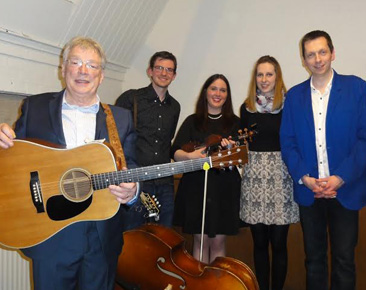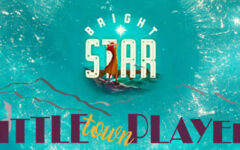
 The November edition of Country Music People magazine contains an article by guitar-playing British bluegrass stalwart Tom Travis in which the author reflects on bluegrass events in Britain during the 1960s.
The November edition of Country Music People magazine contains an article by guitar-playing British bluegrass stalwart Tom Travis in which the author reflects on bluegrass events in Britain during the 1960s.
The 1960s were eventful as the era in which bluegrass music developed in Britain and Travis, with partner Smiley Bowker and bass player Brian Booth – performing as the Double T Ramblers – played an active part.
While the Double T Ramblers were successful in getting work on radio, essentially the BBC, they experienced some demoralising experiences, such as playing for an audience, who sat on its collective hands, in a Jazz music club and, after playing their hearts out in an audition, the producer asked, “Do you do anything else?”. The entertainment business at that time demanded variety.
Folk music clubs were no more receptive than Jazz clubs due to the American repertoire and the use of a double (upright) bass.
Eventually, after a brief retirement, Folk music venues provided regular employment for Tom and Smiley, now minus Booth.
Now, as a neat duo with greater flexibility, we began to gain acceptance by the folk scene. Bluegrass had been given the seal of approval by folk music taste-setter, Pete Seeger and so the more liberally-minded folk club organisers began to book us. We had already appeared on many BBC Country Meets Folk programmes, giving potential bookers the opportunity to judge our capabilities. Our main home-base folk club was the Manchester Sports Guild (the MSG), which helped our career immensely. Not only did they book us regularly but they also booked prestige musicians and bands such as bluesmen, Jesse Fuller, Jimmy Witherspoon and, ecstasy of ecstasies, Bill Monroe and His Blue Grass Boys. Such was the MSG’s belief in our bluegrass music that they hired Manchester’s biggest venue, the Free Trade Hall and placed us at the top of the bill. Amazingly, every seat in that vast auditorium was filled. The Free Trade Hall was, you might remember, built on the site of the Peterloo Massacre and was also the venue at which Bob Dylan was called ‘A Judas’ and booed for ‘going electric’.
Our rise from then on was meteoric. We retained our radio and TV work – on one occasion, travelling to Scotland to appear on the Corries television show. The Corries were a very impressive folk music duo comprising Ronnie Browne and Roy Williamson. And, although you might think that the unofficial Scottish national anthem, Flower of Scotland, has been around for hundreds of years, it was actually written by Roy Williamson and released by The Corries in 1974. We toured the folk clubs of the UK constantly and appeared at the Cambridge Folk Festival in 1967.
Our act was developing strongly with regular work. Not only did our picking and singing get better but our line of patter grew stronger as we kept in what worked and dropped that which didn’t. We developed our comedy in a similar way by keeping in things that we said ad lib that amused our audiences, until we had tight routines that were guaranteed to please and entertain on every occasion. We had visual comedy too with simple props such as a scarf that I put on to sing the ladies part, in a falsetto voice, as I duetted with Smiley, who played the husky male. It was usual for us to play two forty-five minute sets and we had three completely different shows which we recorded in our gig diary so that we could play a different show each time we revisited a venue. I say that we did two forty-fives but the second set invariably turned into an hour as we drove our audience into a frenzy with our own twenty minute psychedelic version of Orange Blossom Special – which we called Orange Blossom Banjo. There is a shorter (six minute) version of it on our album, The Bluegrass Sound Of Tom & Smiley.
And closer to the end of the decade ….
Man landed on the moon for the first time on July 2th 1969… but I missed it. Why? Because I was contracted to be on stage at a large night club in the centre of Manchester, where, at that time, we had a residency. It was called Mr. Smith’s Club and had a large TV lounge which was full to bursting with our audience. As, in our professional way, we gave our all to an empty room, profound history was being created on the screen next door. O the vicissitudes of treading the boards. But then, on our quest to further the cause of bluegrass in Europe, we had history to make of our own.
 Tom Travis is currently working show dates with north-west of England quartet Jaywalkers.
Tom Travis is currently working show dates with north-west of England quartet Jaywalkers.
His recent recordings are available on CD and iTunes download.
Country Music People is available from UK national news vendors and shortly from its website using PayPal.







